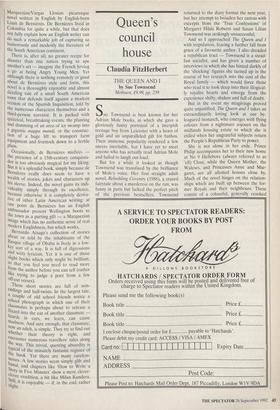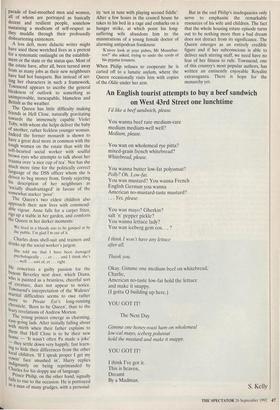Queen's council house
Claudia FitzHerbert
THE QUEEN AND I by Sue Townsend Methuen, £9.99, pp. 239 Sue Townsend is best known for her Adrian Mole books, in which she gave a gloriously funny portrayal of a twerpish teenage boy from Leicester with a heart of gold and an unparalleled gift for bathos. Their immense popularity rendered a few sneers inevitable, but I have yet to meet anyone who has actually read Adrian Mole and failed to laugh out loud.
But for a while it looked as though Townsend was transfixed by the brilliance of Mole's voice. Her first straight adult novel, Rebuilding Coventry (1988), a crazed fairytale about a murderess on the run, was funny in parts but lacked the perfect pitch of the previous bestsellers. Townsend
returned to the diary format the next year, but her attempt to broaden her canvas with excerpts from the 'True Confessions' of Margaret Hilda Roberts and Susan Lilian Townsend was strikingly unsuccessful.
And so I approached The Queen. and I with trepidation, fearing a further fall from grace of a favourite author. I also dreaded a republican tract — Townsend is a stead- fast socialist, and has given a number of interviews in which she has hinted darkly of the 'shocking' figures she turned up in the course of her research into the cost of the Royal family — which would force those who read it to look deep into their illogical- ly royalist hearts and emerge from the experience shifty, shaken and full of doubt.
But in the event my misgivings proved quite unjustified. The Queen and I takes an extraordinarily loving look at our be- leagured monarch, who emerges with flying colours from a nightmare sojourn on the midlands housing estate to which she is exiled when her ungrateful subjects return the People's Republican Party to, power.
She is not alone in her exile. Prince Philip accompanies her to their new home at No 9 Hellebore (always referred to as 'ell) Close, while the Queen Mother, the Waleses, and Princesses Anne and Mar- garet, are all allotted houses close by. Much of the novel hinges on the relation- ships which are built up between the for- mer Royals and their neighbours. These consist of a colourful, generally crooked parade of foul-mouthed men and women, all of whom are portrayed as basically decent and resilient people, somehow sustaining a modicum of self-respect as they muddle through their profoundly disheartening existences.
A less deft, more didactic writer might have used these wretched lives as a pretext for a systematic onslaught on the establish- ment or the state or the status quo. Most of the estate have, after all, been turned away from as many jobs as their new neighbours have had hot banquets. But instead of set- ting her characters in such a framework, Townsend appears to ascribe the general bleakness of outlook to something as unimprovable, inescapable, blameless and British as the weather.
The Queen has little difficulty making friends in Hell Close, naturally gravitating towards the immensely capable Violet Toby, with whom she helps deliver the baby of another, rather feckless younger woman. Indeed the former monarch is shown to have a great deal more in common with the tough women on the estate than with the soft-hearted social worker with soulful brown eyes who attempts to talk about her trauma over 'a nice cup of tea'. Nor has she much more time for the politically correct language of the DSS officer whom she is driven to beg money from, firmly rejecting his description of her neighbours as socially disadvantaged' in favour of the somewhat starker 'poor'. The Queen's two eldest children also approach their new lives with commend- able vigour. Anne falls for a carpet fitter, rigs up a stable in her garden, and comforts the Queen in her darker moments:
We lived in a bloody zoo to be gawped at by the public. I'm glad I'm out of it.
Charles dons shell-suit and trainers and drinks up the social worker's jargon:
She told me that I have been damaged Psychologically . . . er . . . and I think she's • .. well ... sort of, er ... right.
He conceives a guilty passion for the buxom Beverley next door, which Diana,
Who is painted as a brainless, cheerful sort of creature, does not appear to notice. Townsend's interpretation of the Waleses' marital difficulties seems to owe rather more to Private Eye's long-running chronicle, 'Born to be Queen', than to the teary revelations of Andrew Morton. The young princes emerge as charming, easy-going lads. After initially falling about with mirth when their father explains to them that Hell Close is to be their new home — 'It wasn't often Pa made a joke' they settle down very happily, fast learn- ing to hide their differences from the other local children. 'If I speak proper I get my cocain' face smashed in', Harry replies indignantly on being reprimanded by Charles for his sloppy use of language. _ Prince Philip, on the other hand, signally tails to rise to the occasion. He is portrayed as a man of many grudges, with a personal-
ity 'not in tune with playing second fiddle'. After a few hours in the council house he takes to his bed in a rage and embarks on a hunger strike, at which point his long- suffering wife abandons him to the ministrations of a young female doctor of alarming antipodean frankness:
`IC'niver look at your pubes, Mr Mountbat- ten?' she asked, trying to undo the cords of his pyjama trousers.
When Philip refuses to cooperate he is carted off to a lunatic asylum, where the Queen occasionally visits him with copies of the Oldie under her arm.
But in the end Philip's inadequacies only serve to emphasise the remarkable resources of his wife and children. The fact that the whole housing estate episode turns out to be nothing more than a bad dream does not detract from its significance. The Queen emerges as an entirely credible figure and if her subconscious is able to deliver such stirring stuff, we need have no fear of her fitness to rule. Townsend, one of this country's most popular authors, has written an eminently enjoyable Royalist extravaganza. There is hope for the monarchy yet.
You wanna beef rare medium-rare medium medium-well well? Medium, please.
You wan mayo? Gherkin? salt 'n' pepper pickle? You wanna lettuce lady? You wan iceberg gem cos. .. ?
I think I won't have any lettuce after all.
I think I've got it. This is heaven, Dreamt
By a Madman.
An English tourist attempts to buy a beef sandwich on West 43rd Street one lunchtime
I'd like a beef sandwich, please.
You wan on wholemeal rye pitta? mixed-grain french whitebread? Whitebread, please.
You wanna butter low-fat polyunsat? Polly? Oh. Low-fat.
You wan mustard? You wanna French English German you wanna
American no-mustard-taste mustard?
. .. Yes, please.
Thank you.
Okay. Gimme one medium beef on whitebread,
Charlie, American no-taste low-fat hold the lettuce and make it snappy.
(I gotta Q building up here.) YOU GOT IT! The Next Day Gimme one honey-roast ham on wholemeal low-cal mayo, iceberg polunsat hold the mustard and make it snappy.
YOU GOT IT!
S. Kelly



































































 Previous page
Previous page